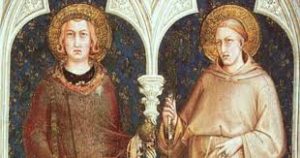HOMILY WEEKDAY 19 02 – Year II
Becoming Like a Child:
Optional Memorial of Saints Pontian and Hippolytus
(Ezk 2:8-3:4; Ps 119; Mt 18:1-5,10,12-14)
**********************************************************
A little trust game I liked to play with children is to invite them to stand straight and stiff, arms at their side, and fall back into my arms. Some trusting ones promptly do just that, while other more fearful ones end up bending over backwards as far as they can, and need some coaxing to let go and fall back.
The message from Jesus today is clear: unless we become like trusting little children, we cannot enter into the kingdom of Heaven.
Not to get into heaven unless we become like little children makes that teaching a pretty serious one. Unfortunately, in our society today, that childlikeness is so often confused with being childish, and no one wants to be that.
Two outstanding traits of children are innocence and trust. We are being asked to strive to be innocent and pure in our lives. The sacrament of reconciliation can certainly be used for that, as will prayer for purity.
The quality, trust, has to do with how children place their complete trust in their parents. Jesus models that for us – he always had complete trust in his Father, and was always conscious of doing only the Father’s will for him.
It can and should be the same with us. We must, like him, depend and trust completely on the Father. We do that by depending and trusting completely on Jesus and his Word.
That is where the first reading comes in. Ezekiel was asked to eat, to consume the Word of God, and then go out to speak to the people of Israel in a prophetic way. That is what we must do – ponder and focus on the Word of God; read and pray with the scriptures; listen to the voice of Jesus in the scriptures, and then share that Word with others.
In both these ways, striving for purity and innocence, and trusting completely in Jesus and the Father through scripture and prayer, we can become childlike.
There are many models to follow. Considering innocence and purity, the magazine Love One Another promotes living a pure life by means of a Pure Hearts Movement that encourages young people to live a chaste life. Concerning being childlike, the late Fr. Brian Jayawardhana OMI prayed that he would die like a child, with a smile on his face, and he did.
Paul D’Arcy, retreat master, shares her story of how she was able to let go of her plans for her life after the loss of her husband and child in a car accident caused by a drunk driver, and find a greater purpose for her life, which she is now living out. That involved being able to forgive the drunk driver, even though he refused to repent or even to accept responsibility.

Saints Pontian and Hippolytus
Today, the church honours two saints, Pontian and Hippolytus, whose stories, while different, intersect and fit the parable of the lost sheep. Saint Pontian succeeded Pope Urban I in 230. When Maximus became emperor in 235, a period of persecution began during which Pontian was exiled to the mines of Sardinia. He resigned his office and died a martyr. St. Hippolytus was a priest in the early third century, a well-known scholar and theologian. A few of his works survive, including a prayer on which our Eucharistic Prayer II is based. When Callistus became pope in 217, Hippolytus rebelled for some reason, and became that lost sheep. In 235, banished to the Sardinian mines, Hippolytus met the exiled Pontian, was reconciled to the Church, and died a martyr’s death.
The Eucharist is a gathering of the children of God, who come to listen to God’s Word, and to be nourished at our family table with the Body and Blood of Jesus. May our celebration help us to ponder God’s Word like Ezekiel, and be childlike like Saints Pontian and Hippolytus, so as to already participate in the Kingdom of God.



